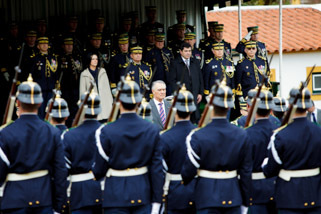Speech delivered by the President of the Republic in the Award Ceremony of the Fernando Namora Prize
Estoril Casino, November 28, 2006
Honourable President of the Sociedade Estoril-Sol
Honourable Mayor of Cascais
Honourable writers Agustina Bessa Luís
Honourable writers Maria Velho da Costa
Honourable prize-winner
Ladies and Gentlemen
I am indeed pleased to be here today, to hand over the Fernando Namora prize, unanimously awarded to Miguel Real for his novel “A voz da terra” (The voice of the land).
Pleased, firstly, to see the recognition of the merit of someone who is renowned for the quality of his work and his art.
Pleased, equally, to see an institution like the Estoril Casino, engaged in stimulating and promoting literary and artistic activities, adding to its entrepreneurial activity a remarkable role in the field of culture.
Miguel Real’s book was chosen, amongst those published in Portugal in 2005, for its «literary quality» and for its resurgence of an outstanding period of our history.
In accordance with the unanimous opinion of the jury presided by Agustina Bessa Luis, “The voice of the land” is outstanding due to «the exceptional narrative construction of some historical facts, especially the 1755 Earthquake», without forgetting «the relations between Portugal and Brazil» as well as «the intricacy of living and of conflicts within the various ethnic communities in the Lisbon of the XVIII century».
We are faced by a true picture of our collective memory, enabling an insight into the social, political and intellectual environment existing at the time of the tragedy which was the Earthquake.
250 years later, this novel recalls, not only the earthquake that shook Lisbon and other locations, but above all the commotion caused by the new ideas that, in those days, the Country was facing with the challenge of modernism.
I congratulate the author for the public recognition of his work and for this prize, which joins the prize awarded by “Círculo de Leitores” (Reader’s Club), previously attributed to another of his books.
I am also very pleased to note how his historical novels are appreciated, thus proving the interest that our common past continues to provoke whenever it is suggestively reconstituted, as is the case with Miguel Real’s fiction.
The memory of what we were as a people is the best foundation on which we can plan and build the future.
I also wish to applaud the Estoril Casino for the activity it has been developing in the domain of Culture and of which the Fernando Namora prize is a prime example.
The list of authors and works contemplated in the ten editions of this award, as well as the multiple artistic events which regularly take place in these premises, are a proof of the much that people and enterprises can and must do in this area.
It is my fond hope that the example continues bearing fruit in new initiatives of the Estoril Casino, and, if possible, to be followed by other institutions.
